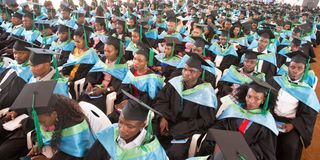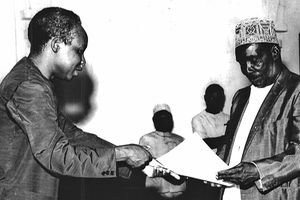Graduate teachers risk becoming irrelevant in new recruiting system

What you need to know:
- While the new system presents challenges for some, it signifies Tanzania’s commitment to improving education quality by ensuring teachers entering the profession are well-equipped
Dar es Salaam. Tanzania’s planned approach to hiring teachers through interviews, irrespective of when they graduated, poses a potential risk of irrelevance for the thousands of graduate teachers.
This change, set to commence in 2025, mandates that all teaching candidates undergo rigorous interviews, with those who have been waiting for employment for years cautioned to continuously update their skills and knowledge.
Education, Science and Technology minister Prof Adolf Mkenda, while in the 2024 digital teaching skills competition for English among primary school teachers on June 25, 2024, highlighted the importance of continuous professional development.
“We will not look at when you graduated; therefore, it is best for every graduate to have a routine of refreshing and developing themselves to stay up to date. We cannot hire teachers out of sympathy; instead, we want to uphold the teaching profession like any other.” This caution serves as a wake-up call for over 300,000 graduate teachers who completed their studies between 2014 and now but remain unemployed.
The upcoming interview system aims to select the best candidates, aligning with global standards observed in countries like Singapore, the United States, and Germany.
In these nations, proficiency exams, practical assessments, and psychological tests ensure that only the most capable individuals enter the teaching profession.
Tanzania’s initiative mirrors this approach, striving to enhance the quality of education by hiring competent and well-prepared teachers.
Education expert Ms Justina Mtambalike supports this move, asserting that without practice, it is difficult for those who have been without employment for several years to pass the expected interview or examination system.
“The Minister of Education is right. You cannot sit for more than four years and still have the same abilities without regularly refreshing or volunteering.”
The current employment system, where selected applicants directly report to schools, has faced criticism for its inefficiency and susceptibility to nepotism, according to the minister.
“The new interview-based hiring process aims to eliminate these issues and ensure that only the most qualified teachers are entrusted with educating the nation’s children,” Prof Mkenda noted. Quality assurance expert Mr Daniel Mbwana believes that this system will improve teaching standards, although he urges the government to provide ample job opportunities to address the existing teacher shortage.
“There is no problem at all, and I believe if someone needs a job in their profession, they will prepare to take that qualifying exam. But through this system, the government should plan to hire more teachers to help implement new curricula,” Mr Mbwana stated.
His perspective highlighted the dual necessity of maintaining high standards while also addressing the significant demand for teachers in Tanzania.
The demand for primary and secondary school teachers remains critical. According to the President’s Office-Regional Administration and Local Government Authorities (PO-RALG), as of February 2023, Tanzania needed 362,189 primary school teachers but had only 175,864 employed.
This disparity results in an average of one teacher for every 70 students, far above the desired ratio of 1:45. For secondary schools, the shortage is equally dire, with 84,700 teachers employed against a requirement of 174,632.
In response to these challenges, the government plans to hire 13,000 teachers this year under the existing system before transitioning to the interview-based method.
“Those of you teachers who are continuing and those we are hiring soon will not be involved in this process. What we want is to bring in your fellow teachers who will be able to help implement the current education demand,” he said.
The push for higher standards in teacher recruitment aligns with Tanzania’s broader efforts to reform its education system. The implementation of the new Education and Training Policy 2024 and revised curricula across all education levels reflects a commitment to quality education.
Concerning the competition, like last year, ten pre-primary and primary teachers have been awarded for their exemplary skills. Notably, three teachers from Arusha emerged as winners, with Jenifer Chuwa and Sophia Moses from Enaboishu Academy securing the top two prizes, and another from Tuvaila Primary School in Meru taking third place.
The Director General of the Tanzania Institute of Education (TET), Dr Aneth Komba, explained that the awards aimed to motivate teachers and recognise their contributions.
“These awards are coordinated by TET and involve public school teachers from all councils in the country,” she said, adding that over 3,700 teachers participated in the competition.
The top winners received cash prizes and certificates, celebrating their dedication to enhancing their teaching skills.





